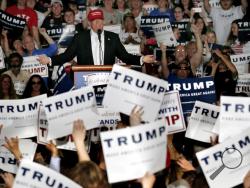HARRINGTON, Del. (AP) — As his top aides spent the week gingerly courting Republican insiders at a seaside resort in Florida, Donald Trump was busy railing against them.
"The system is all rigged," Trump told supporters at a rally Friday at the Delaware State Fairgrounds ahead of the GOP primary. "That's why we have to win big. That's why on Tuesday, everyone has to go out and vote. We have to win big because the system is rigged."
While it may seem counterproductive, Trump's foot-stomping has served as a rallying cry to boost voter turnout and allowed him to continue to appeal to voters who feel disenfranchised. The "rigged" system also is a convenient scapegoat, taking the blame for any future potential losses and lost delegates instead of an outmaneuvered campaign.
Trump has won more states than his rivals, yet his team has been badly outplayed by Ted Cruz in the intricate game of ensuring that supportive delegates make it to the GOP convention in July in Cleveland.
Pennsylvania, one of five states voting Tuesday, has an especially confusing delegate system. While the winner of its primary will emerge with 17 delegates, the vast majority of delegates — 54 — are unbound and can vote for whomever they choose. The ballot will feature 162 potential delegates, but it will offer no information about whom they support. That means voters who haven't consulted with the campaigns about their rosters will be voting blind.
Trump has yet to specifically target Pennsylvania's process, but his argument would only grow stronger if he were to win the majority of votes in the state — opinion surveys show him with a significant lead — yet emerge with fewer delegates than Cruz.
Trump has been relentless in his criticism of the delegate system, slamming party "bosses" and calling out the Republican National Committee and its chairman, Reince Priebus. On Friday, Trump compared himself to a prize fighter competing in rival territory.
"The fighters have a great expression. When you have a champ that goes into a big territory but it's unfriendly; it's home of the other fighter. But the good ones go, 'No, no, I'm not worried,'" he said. "'Because if I knock him out there's nothing the judges can do. Right? What we have to do is knock them out with the volume of our votes."
Speaking to reporters earlier this week, Paul Manafort, a senior Trump aide, brushed off the idea that the candidate's rhetoric was making it more difficult to build bridges with party leaders.
"What he's slamming is the system. He's saying the system is rigged. And the system is rigged. It's rigged in all 50 states where they have different rules and that don't take into account modern presidential campaigns," he said.
Manafort added that Trump wanted to work with Priebus to change the system for the next election. "That's where things are getting confused," he said. "He's saying we've got to change rules so the next time, when people vote, their vote counts."
Nonetheless, frustration with Trump's attacks on the RNC and the integrity of the nomination process were widespread in Florida, even as Trump's team was trying to make amends.
In a private meeting Thursday with party officials, Manafort tried to assure them that Trump was on their side and prepared to fundraise for the party. He stressed that the candidate had had some "very good" conversations with Priebus and said the campaign hoped to work closely with state party leaders to build its general election campaign.
Meanwhile, at the Delaware State Fairgrounds, Trump's supporters said the billionaire is right to be angry at the Republican delegate process.
"It's not democratic," said Paul Eugstenberg, 72, a retired pilot from Dover, Delaware. "This should be decided by the voters. It should not be decided at the convention. They have to fix this. This is not how this should work."
Some suggested that if Trump were leading the delegate race going into the convention only to have someone else nominated, it would make them consider staying home in November instead of voting for the Republican nominee.
"If this is taken from Mr. Trump, it would destroy the Republican Party," said Debbie Patty, a retired teacher from Greenwood, Delaware. "People would think their vote doesn't count and that the party doesn't care about them."
"I would never vote for a Democrat, but I'm not sure I could vote for a Republican in that scenario, either," Patty said. "That means not voting at all, and I hate that idea. But it might be what I have to do."
___
Colvin reported from New Jersey. Associated Press writer Steve Peoples in Hollywood, Florida, contributed to this report.

